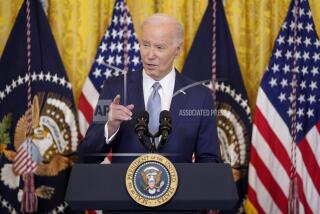Trump once called Judge Curiel a ‘hater,’ but jurist now sides with him in border wall ruling
Reporting from san diego — A federal judge in San Diego ruled Tuesday that the Trump administration did not abuse its discretion in waiving environmental laws in its rush to begin border wall projects in Southern California, an order that gives a green light to current and future barrier construction.
The state of California and a coalition of environmental groups sued the U.S. Department of Homeland Security, arguing that the government had overstepped its bounds by using a law to avoid complying with environmental regulations for three projects: building eight border wall prototypes on Otay Mesa and replacing existing fencing in both San Diego and Calexico.
The plaintiffs argued that the law the government depended on was outdated and not intended to give never-ending authority for border projects.
But U.S. District Judge Gonzalo Curiel ruled, in a 101-page order, that the law does not violate the Constitution and it gives DHS wide discretion when it comes to border security. He declined to rule on other claims that were non-Constitutional, pointing to a part of the law that precludes him from doing so unless he can find the government violated a “clear and mandatory” statutory provision. He said that an analysis found that that high burden could not be met.
The ruling comes more than two weeks after all sides argued the case in a federal courtroom in San Diego.
The case has garnered special attention because of Curiel’s touchy history with President Trump. Curiel presided over two class-action lawsuits against Trump University and ultimately approved the cases’ $25-million settlement. Early on in the litigation, Trump on the campaign trail called out Curiel for his “Mexican heritage,” suggesting the judge was biased against him because of Trump’s strict border views.
In his ruling Tuesday, Curiel at the outset acknowledged the political dissension over the border wall — and hinted at the extra scrutiny he and this case are under — but stressed that his decision here does not and cannot consider whether such border barrier plans “are politically wise or prudent.”
He then quoted U.S. Supreme Court Chief Justice John Roberts — who he pointed out is a fellow Indiana native: “Court(s) are vested with the authority to interpret the law; we possess neither the expertise nor the prerogative to make policy judgments. Those decisions are entrusted to our Nation’s elected leaders, who can be thrown out of office if the people disagree with them. It is not our job to protect the people from the consequences of their political choices.”
The order means a fence replacement project that began last week in Calexico won’t be interrupted. The plan, which was initiated well before Trump took office, calls for replacing two miles of decades-old landing mats with 30-foot bollards placed closely together.
As for the wall prototypes — which Trump apparently plans to visit sometime in mid-March — that project has already been completed, and the replacement project elsewhere in San Diego is not set for several months.
Brian Segee, a senior attorney at the Center for Biological Diversity, which filed the initial lawsuit in the case, said the group intends “to appeal this disappointing ruling, which would allow Trump to shrug off crucial environmental laws that protect people and wildlife.”
“The Trump administration has completely overreached its authority in its rush to build this destructive, senseless wall,” Segee continued. “They’re giving unprecedented, sweeping power to an unelected agency chief to ignore dozens of laws and crash through hundreds of miles of spectacular borderlands. This is unconstitutional and shouldn’t be allowed to stand.”
Davis writes for the San Diego Union-Tribune.
UPDATES:
4:35 p.m.: This post was updated with a staff version of the story.
This article was originally published at 1:50 p.m.
More to Read
Sign up for Essential California
The most important California stories and recommendations in your inbox every morning.
You may occasionally receive promotional content from the Los Angeles Times.










